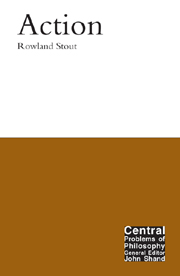Book contents
- Frontmatter
- Contents
- Acknowledgements
- 1 Introduction: inward-looking and outward-looking approaches to agency
- 2 Acting for a reason
- 3 Reasons and passions
- 4 Agent causation
- 5 Mental causation
- 6 Deviant causal chains and causal processes
- 7 Acting with an intention
- 8 Prior intention
- 9 The metaphysics of action
- Conclusion
- Notes
- Suggestions for further reading
- References
- Index
6 - Deviant causal chains and causal processes
- Frontmatter
- Contents
- Acknowledgements
- 1 Introduction: inward-looking and outward-looking approaches to agency
- 2 Acting for a reason
- 3 Reasons and passions
- 4 Agent causation
- 5 Mental causation
- 6 Deviant causal chains and causal processes
- 7 Acting with an intention
- 8 Prior intention
- 9 The metaphysics of action
- Conclusion
- Notes
- Suggestions for further reading
- References
- Index
Summary
Deviant causal chains
Suppose we accept that the causal theory of action provides a necessary condition for intentional action. This means that if an agent acts intentionally then some state they are in or some aspect of their psychology causes the event of their behaving in a certain way or their body moving in a certain way or certain other results being achieved. It does not follow that this is a sufficient condition: that if the causal condition is met then the agent must be acting intentionally. Indeed it would follow from the possibility of deviant causal chains – a possibility I consider in this chapter – that it is not a sufficient condition. But for the causal theory of action to be part of a complete account of agency it had better be part of a set of conditions that are both necessary and jointly sufficient. So the causal theory has some work to do if it is supposed to do more than just reveal some conceptual commitments in our idea of action.
Chisholm (1966) describes a case where someone wants to kill his uncle to inherit a fortune, and having this desire makes him so agitated that he loses control of his car and kills a pedestrian, who turns out to be his uncle. The conditions of the causal theory seem to be satisfied. The nephew's wanting to kill his uncle causes his body to move in a certain way, resulting in the intended state being achieved.
- Type
- Chapter
- Information
- Action , pp. 83 - 98Publisher: Acumen PublishingPrint publication year: 2005



